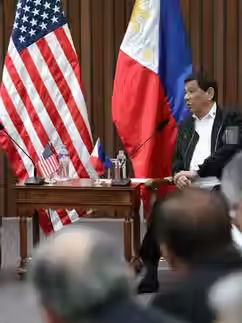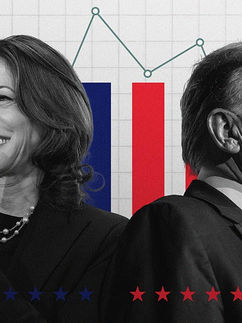Leitis in Waiting
By Eliza Wilson

Leitis in Waiting (2018) is a powerful documentary directed by Dean Hamer, Joe Wilson, and Kumu Hina Wong-Kalu, focusing on the life of Joey Mataele and the Tongan Leitis. The film provides a deep dive into the cultural, social, and religious challenges faced by Leitis, including the complexities of navigating family rejection as well as dealing with conservative views held by many religious leaders.
One of the central highlights of the documentary is the annual Miss Galaxy Pageant, a joyous celebration of the Leitis and the broader LGBTQI+ community. This event also serves as a form of advocacy and visibility for the community in a country where LGBTQI+ rights are limited. Through intimate storytelling, Leitis in Waiting reveals the resilience and solidarity of the Leitis, as they navigate balancing traditional Tongan values with the hope for acceptance and equality.
The film touches on the tension between the church's influence and the lives of the Leitis, shedding light on the role of religion in their experiences. The documentary offers an emotional, insightful and culturally rich portrayal of their lives, fostering understanding of the intersection between gender, tradition and faith in Tonga.
Leitis are Tongans assigned male at birth who identify as gender diverse, usually with a feminine gender expression. Some may identify as transgender, while others prefer the term Leiti. The term Leiti is derived from the broader term fakaleitī. This term was introduced by researchers to describe gender diverse people in Tonga. Due to its negative connotations, the shortened Leiti is the preferred term. Leitis share similarities with Fa’afafine in Samoa, Māhū in Hawaii and Tahiti and Vakasalewalewa in Fiji.
The documentary aims to bring attention to nations that still criminalise sexual minorities. The Tongan Criminal Offences Act criminalises cross-dressing, male consensual same-sex activity and heterosexual sodomy, with a maximum penalty of 10 years imprisonment. These crimes are not enforced – there has never been a conviction for consensual same-sex activities. Despite this, the criminalisation of same-sex relationships points to the lack of rights and freedom for the LGBTQI+ community within Tonga. This is further emphasised through Tonga’s rejection to decriminalise same-sex conduct, and their decision to not sign the United Nations Joint statement on ending acts of violence and related human rights violations based on sexual orientation & gender identity, making them one of only two Pacific Island States not to sign.
Leitis have long existed in Tonga, holding a respected place in Tongan Society and are often called upon as helpers to the Tongan Royal Family. Joey herself has a close relationship with the royal family, with Tongan Princess Salote Lupepau'u Tuita describing her mother, the Princess Royal’s close relationship with Joey since childhood.
Despite the close relationships Leitis have with the royal family, the advent of Christianity in Tonga eroded their previously accepted place in the Tongan society. Religion and its intersections with gender diversity and LGBTQI+ issues are some of the themes explored in the documentary. Religion is central to Tongan life, with Sunday strictly a day for the Church, as enshrined in the constitution, and over 95% of Tongans identifying as Christian.
Christianity came to Tonga in waves since the 1820s through multiple missionary trips by various Christian denominations. As Christianity took root and spread across Tonga, attitudes towards Leitis shifted and conservative, anti-LGBTQI+ opinions arose, spurring rejection and discrimination against Leitis.
In Leitis in Waiting, the Free Wesleyan Church of Tonga, a methodist denomination with the largest following in Tonga, is introduced due to its widespread influence. It counts the Tongan Royal Family as members. The Free Wesleyan Church takes a cautious approach to LGBTQI+ issues in Tonga, emphasising that homosexuality and gender diversity are particularly sensitive issues in Tongan culture, while claiming that “the problem with human rights is there are no limits, no control.”
More recent religious influences, such as the Tonga Fellowship for Revival Evangelical Church, have further complicated matters. As Joey explains, “it’s not really the large churches that go against us [Leitis]. It’s the smaller churches”. Pastor Barry Smith Taukolo, a televangelist in Tonga, is a vocal opponent of the Leitis. He publicly ridiculed them, stating that they need to “find Jesus” and return to being men. When asked about Joey, he suggested that she should be arrested and imprisoned as a lesson.
Pastor Barry is a divisive figure in Tonga with extremist views. He has perpetuated views that the COVID-19 vaccine is ‘satanic’ and part of an international conspiracy for the Antichrist to control people.
In contrast, the Catholic Church in Tonga, specifically Saint Mary’s Cathedral, where many Leitis attend and find community, has taken a more inclusive approach. In the documentary, the Cardinal Soane Patita Paini Mafi emphasised the importance of standing strong against discrimination and welcoming Leitis as they are.
The documentary also provides insight into how Western views on LGBTQI+ issues are received in Tonga. Leitis and their supporters reject the idea of leaving Tonga to find acceptance elsewhere, instead emphasising that Tonga is their home, and change must come from within the Pacific and Tongan cultural framework.
The Tongan Leitis Association (TLA) has made remarkable strides. The first Tongan nightclub was created as a safe space for Leitis, though men often harassed them under the prevailing belief that they could "beat the femininity" out of them. In response, Papiloa Foliaki, the nightclub owner, and 5 Leitis including Joey created the Tongan Leitis Association, which provides emergency accommodation, basic necessities, and focuses on societal change. Having a Tongan Princess as the association’s patron has lent credibility and broken down barriers. The Tongan Royal Family are seen as custodians of Tongan culture, and therefore their support of the Leitis reaffirms Leitis position and importance in Tongan culture.
The Miss Galaxy Pageant started in 1993 as a way for the TLA to advocate for LGBTQI+ rights and to raise funds for their HIV awareness programs. All contestants are Leitis. The pageant celebrates Leitis, and the scenes of the pageant highlight the joy, pride, and the freedom they feel as they embrace their identities. It is strongly supported by the royal family — with Honourable Salote Lupepau'u Salamasina Purea Vahine Ari'i o'e Hau Tuita, the eldest daughter of Her Royal Highness Princess Salote Mafile'o Pilolevu Tuita, serving as Patron.
The documentary culminated with a national human rights meeting organised by the TLA in response to protests against LGBTQI+ rights spearheaded by Pastor Barry.
Numerous Tongan church leaders including from the Methodist, Wesleyan and Catholic churches staged protests in opposition to Tonga’s intention to ratify the United Nations Convention on the Elimination of Discrimination Against Women (CEDAW). They saw the ratification as anti-Christian, with posters declaring “CEDAW = 666! Evil!” and “CEDAW is a Secret Agent of Satan”. There were major concerns that CEDAW could pave the way for progress on same-sex marriage and abortion access, both of with are unacceptable to the church leaders.
These protests also led to a rise in abuse and violence towards the Leitis and members of the LGBTQI+ community. For safety reasons, the annual Miss Galaxy Pageant was cancelled and replaced with a human rights meeting. The meeting brought together church leaders and politicians in Tonga to discuss issues of human rights, particularly those affecting LGBTQI+ people.
Leitis in Waiting opens with a homage to Keuli Malakai, a Leiti murdered shortly after the film was completed. Furthermore, in 2021, the president of the Tongan Leitis Society — Polikalepo ‘Poli’ Kefu— was murdered. A lifelong activist for Tonga’s LGBTQI+ communities, he also served as a chairman of the Pacific Protection Gender Inclusion Network and the Communications Officer for the Tonga Red Cross Society. Despite the immense progress the Leitis create, it is paramount to remember the violence, abuse and hatred that exists towards them and the danger they face daily.
Leitis in Waiting can be viewed on YouTube and Plex for free.
Eliza is currently completing a Master of International Law and Diplomacy after attaining a Bachelor of Asian Studies from The Australian National University. Eliza is particularly interested in investigating international affairs through a gendered lens. Further, she focuses on intersectional studies such as gender security post-conflict and gender issues that arise due to the impacts of climate change.

















תגובות